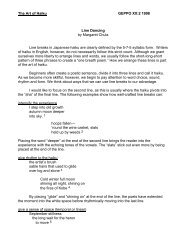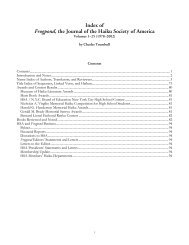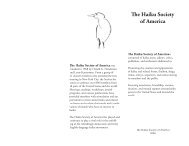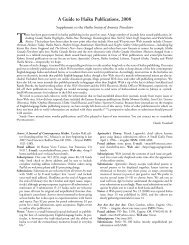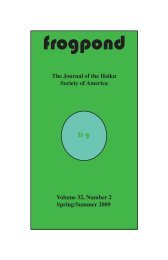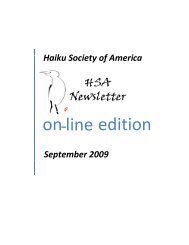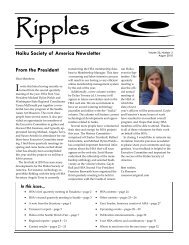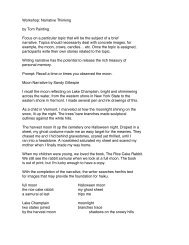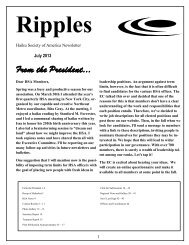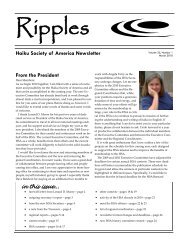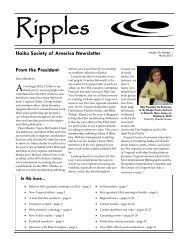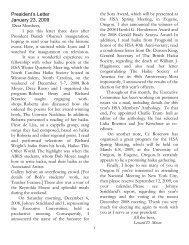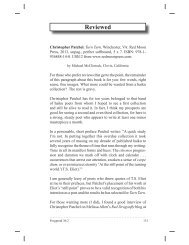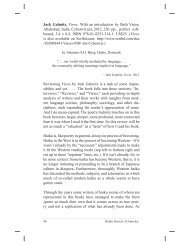Frogpond 34.3 • Autumn 2011 (pdf) - Haiku Society of America
Frogpond 34.3 • Autumn 2011 (pdf) - Haiku Society of America
Frogpond 34.3 • Autumn 2011 (pdf) - Haiku Society of America
Create successful ePaper yourself
Turn your PDF publications into a flip-book with our unique Google optimized e-Paper software.
perceived. Through this transparent seeing, our own existence<br />
is made much larger.” Would you please elaborate on<br />
how this type <strong>of</strong> seeing enlarges our existence?<br />
JANE: I’ve come to feel that every good poem does this, not<br />
only haiku. The exchange currency <strong>of</strong> the imagination is fundamentally<br />
transformative and empathic. The current thinking<br />
in neuroscience is that this recreation <strong>of</strong> other within self has<br />
something to do with mirror neurons, but poets have known<br />
the alchemies <strong>of</strong> empathy from the beginning. Permeability is<br />
how image works, how metaphor works. Every time we take<br />
in an image in a poem, we become for an instant that image.<br />
Reading “mountain,” I become for that moment everything<br />
I know <strong>of</strong> mountainness—its steepness, its insects, its largeness,<br />
its seeming immobility punctuated by streams or rockslide,<br />
what it asks <strong>of</strong> the legs that travel it, what it asks <strong>of</strong> the<br />
breathing, <strong>of</strong> the eyes, what it tells us <strong>of</strong> abidingness and perspective,<br />
<strong>of</strong> distance and scale. Any time we take in a poem’s<br />
held experience, we become that experience. The experience<br />
<strong>of</strong> a poem is not “about” life—it is life. And so taking in a good<br />
poem, our lives are expanded by that poem’s measure. One <strong>of</strong><br />
the great paradoxes <strong>of</strong> haiku is that the measure <strong>of</strong> taken-in<br />
meaning can be so large, from a vessel so small, and how<br />
meaning in haiku can reach in almost any direction. A haiku<br />
can puncture our human hubris, or can remind us that we too<br />
are going to die. It can pierce us with the beauty <strong>of</strong> spareness<br />
or open us to the futility <strong>of</strong> ambition. It can evoke humor,<br />
memory, grief. It can, at times, do all these things at once.<br />
CE: You also note that “...the haiku presents its author as a person<br />
outside any sense <strong>of</strong> the personal self.” Do you see contemporary<br />
English-language haiku presenting the authors as people<br />
outside a sense <strong>of</strong> the personal self? What might the author<br />
gain from striving to experience and write haiku in this manner?<br />
JANE: I recently judged a haiku competition and was a bit<br />
startled by the frequency <strong>of</strong> the pronoun “I” in one form or the<br />
other, and by the strong presence <strong>of</strong> personal life that was in<br />
them, including in those I chose as the winners. In some cases<br />
. . . . . . . . . . . . . . . . . . . . . . . . . . . . . . . . . . . . . . . . . . . . . . . . . . . . . . . . . . . .<br />
<strong>Frogpond</strong> 34:3 69



